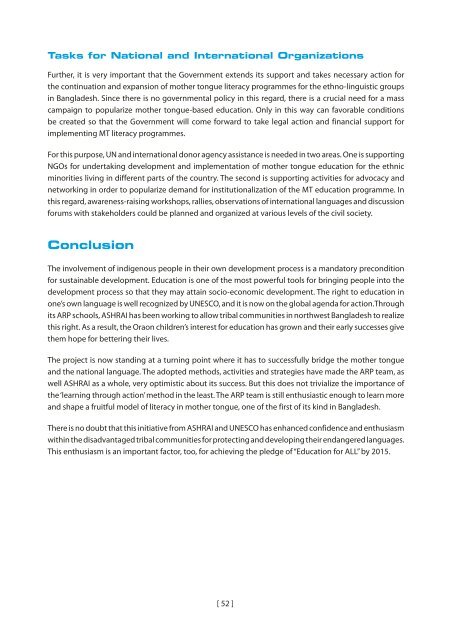Mother Tongue-based Literacy Programmes: Case Studies of Good ...
Mother Tongue-based Literacy Programmes: Case Studies of Good ...
Mother Tongue-based Literacy Programmes: Case Studies of Good ...
Create successful ePaper yourself
Turn your PDF publications into a flip-book with our unique Google optimized e-Paper software.
Tasks for National and International OrganizationsFurther, it is very important that the Government extends its support and takes necessary action forthe continuation and expansion <strong>of</strong> mother tongue literacy programmes for the ethno-linguistic groupsin Bangladesh. Since there is no governmental policy in this regard, there is a crucial need for a masscampaign to popularize mother tongue-<strong>based</strong> education. Only in this way can favorable conditionsbe created so that the Government will come forward to take legal action and financial support forimplementing MT literacy programmes.For this purpose, UN and international donor agency assistance is needed in two areas. One is supportingNGOs for undertaking development and implementation <strong>of</strong> mother tongue education for the ethnicminorities living in different parts <strong>of</strong> the country. The second is supporting activities for advocacy andnetworking in order to popularize demand for institutionalization <strong>of</strong> the MT education programme. Inthis regard, awareness-raising workshops, rallies, observations <strong>of</strong> international languages and discussionforums with stakeholders could be planned and organized at various levels <strong>of</strong> the civil society.ConclusionThe involvement <strong>of</strong> indigenous people in their own development process is a mandatory preconditionfor sustainable development. Education is one <strong>of</strong> the most powerful tools for bringing people into thedevelopment process so that they may attain socio-economic development. The right to education inone’s own language is well recognized by UNESCO, and it is now on the global agenda for action.Throughits ARP schools, ASHRAI has been working to allow tribal communities in northwest Bangladesh to realizethis right. As a result, the Oraon children’s interest for education has grown and their early successes givethem hope for bettering their lives.The project is now standing at a turning point where it has to successfully bridge the mother tongueand the national language. The adopted methods, activities and strategies have made the ARP team, aswell ASHRAI as a whole, very optimistic about its success. But this does not trivialize the importance <strong>of</strong>the ‘learning through action’ method in the least. The ARP team is still enthusiastic enough to learn moreand shape a fruitful model <strong>of</strong> literacy in mother tongue, one <strong>of</strong> the first <strong>of</strong> its kind in Bangladesh.There is no doubt that this initiative from ASHRAI and UNESCO has enhanced confidence and enthusiasmwithin the disadvantaged tribal communities for protecting and developing their endangered languages.This enthusiasm is an important factor, too, for achieving the pledge <strong>of</strong> “Education for ALL” by 2015.[ 52 ]

















